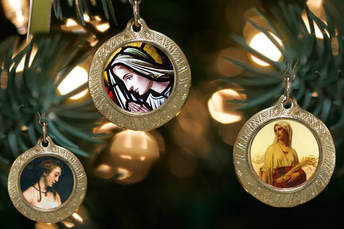Advent at Covenant
|
You're invited to celebrate Advent with Covenant!
Rev. Laura Mayo's proclamation series will be on the women in Jesus' genealogy.
December 2: Tamar and Rahab Worship is at 9 am and 11 am We will trim our tree at 10 am Interestingly, in Matthew’s male-focused telling of Jesus’ genealogy, five women appear. The first woman is named Tamar. Tamar was the widowed daughter-in-law of Judah who disguised herself as a prostitute in order to conceive a child with Judah. (Her story is told in Genesis 38.) The second woman mentioned is Rahab who is identified as a prostitute and a Gentile living in Jericho. She gave hospitality to the Jewish spies who came to Jericho. She hid them from the king of Jericho who wanted to kill them. (Her story is found in Joshua 2 and 6.) Rahab, like Tamar, used creativity to make her way in a world with precious few choices for women. December 9: Ruth Worship is at 9 am and 11 am Ruth is the third woman mentioned in the genealogy of Jesus. Ruth was a widow and a Moabite. She loved her mother-in-law, Naomi. Her words to Naomi are used in many wedding vows: “Where you go I will go, and where you stay I will stay. Your people will be my people and your God my God” (Ruth 1:16). Like the women before her, Ruth had limited choices. Yet, she used the resources available to her and made a way. Planning with her mother-in-law, Naomi, she seduces Boaz and gains another mother-in-law, Rahab. I can only imagine the conversations had by Naomi, Ruth, and Rahab. December 16: Bathsheba Worship is at 9 am and 11 am Caroling and wassail will be in Huff Fellowship Hall at 10 am The fourth woman mentioned in Jesus' genealogy is not actually named. She is referred to only as "Uriah's wife." This phrasing is certainly intentional. Bathsheba was Uriah’s wife when King David saw her and took her and then had her husband killed. Bathsheba is often referred to as an adulteress but that term implies choices that, given power and status differences, were likely not available to her. Our interpretation of the stories of Jesus might shift as we consider a Jesus who grew up amidst rumors of scandal and pointed insults. Jesus’ protection of the woman caught in adultery, for example, takes on a new level of intensity: "If any one of you is without sin, let him be the first to cast a stone at her” (John 8:7). These are the words of the great-grandson of Bathsheba. December 23: Mary Worship is at 11 am only It is through Bathsheba that the line of decedents is carried first to Solomon and then on and on until the fifth and final woman mentioned in this genealogy: Mary. Mary is mentioned in this genealogy simply as wife to Joseph and mother to Jesus. Many women in biblical stories appear in domestic settings. Sarah is in her tent, baking cakes. Rachel is drawing water at the well. Martha is fussing around in the kitchen. The woman who lost a coin is sweeping the house. But with Mary, there is no evidence of any domestic work on her part. We never find her cooking, cleaning, washing up. What we find her doing, over and over, is traveling - on journeys that involve risks and an element of danger. The biblical evidence suggests that Mary loved adventure. Traveling alone, like every prophet before her, she sets out on her first journey, to her cousin Elizabeth’s house, to sing her song of justice, of the mighty brought low and the humble exalted. There will be more journeys in Luke: to Bethlehem; to Jerusalem when Jesus is twelve; to Cana to instruct Jesus on his first miracle; to Jerusalem when he is crucified. Mary knows that for having a child out of wedlock, she could be stoned for adultery. At the very least, she could be rejected by Joseph, her parents, her village. She could spend the rest of her days in even deeper poverty, struggling to keep herself and her child fed outside the safety of a marriage and community. Meister Eckhart writes: “We are all meant to be mothers of God. What good is it to me if this eternal birth of the divine . . . takes place unceasingly, but does not take place within myself? And, what good is it to me if Mary is full of grace if I am not also full of grace?” We are all called to be mothers of God, called to follow in the way of brave, prophetic Mary. |
An introduction by Laura Mayo:
From the very beginning the stories of Jesus give us a way to understand God as relational – a God like us who knows what it is to be ridiculed and embarrassed; a God like us who knows what is to love and be loved; a God like us with family – with history – with a family system full of connection and disconnection, creativity and dysfunction, skeletons and role models, mistakes repeated again and again and some lessons learned. Jesus' grandmothers bust out of the confines of socially accepted silence to pave the way for him. Jesus is descended from a line of very strong, resilient, loyal, resourceful, and faithful women. He is descended from powerful women each surrounded by their own sexual scandal. The Gospels tell us that the adult Jesus is mocked and ridiculed. He is abused for spending his time with sinners and prostitutes. Jesus comes to the defense of the poor, the widowed, the outcast, again and again. Perhaps Mary and Joseph made sure he knew the stores of his ancestors. Perhaps he learned through family history that resourcefulness and creativity are often unorthodox. It is not a comfortable story that creates Jesus. The man who stands on a mountain and proclaims “Blessed are you when people insult you, persecute you and falsely say all kinds of evil against you” knows what it is to be insulted – knows what it is to come from a family with members society labels disgraceful (Matthew 5). This Advent, as you dust off the shepherds and the wise ones, as you place the angels and the animals, consider the ancestry of Jesus – consider that the God we meet in the life of Jesus knows all about human frailty and dysfunction, knows all about creativity and survival, knows all about connection and disconnection. You are invited to join our candlelight Christmas Eve service at 5:30pm. |

